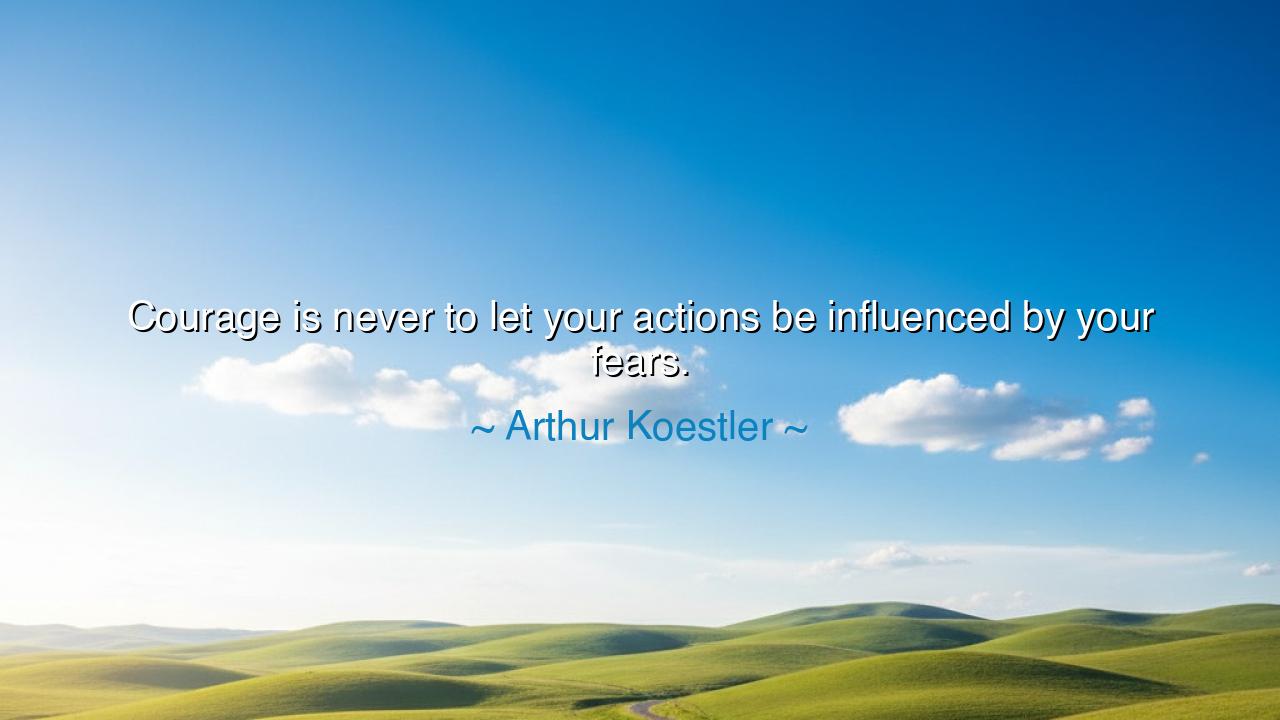
Courage is never to let your actions be influenced by your fears.






The philosopher and novelist Arthur Koestler, who witnessed the tumult of war, revolution, and exile, once declared: “Courage is never to let your actions be influenced by your fears.” These words, though uttered in the modern age, echo with the timbre of ancient wisdom. They call upon the eternal truth that while fear is the shadow that walks beside every human soul, courage is the light that guides its steps. Fear cannot be banished from existence—it is woven into the fabric of our being—but the noble heart learns not to bow before it. To act rightly, even when fear howls in the breast, is the essence of the heroic life.
In the days of old, the philosophers and warriors alike wrestled with this truth. The Stoics taught that fear is the child of illusion, that the wise must not allow it to rule the will. And so Koestler’s words join that ancient chorus, reminding us that courage is not the absence of fear, but the mastery of it. To be human is to tremble; to be great is to act despite trembling. It is easy to move forward when the path is safe and certain; it is divine to take a step when the road vanishes into darkness. For in that moment, the soul declares its freedom: “I am not ruled by fear—I am ruled by purpose.”
Koestler’s insight was born from a life spent amid chaos. He lived through the rise of totalitarian regimes, imprisonment, and the disillusionment of ideals. He saw how fear—of punishment, of rejection, of death—could turn good men into cowards and silence the voice of truth. From that experience, he learned that the greatest chains are not made of iron, but of dread. Thus, he proclaimed that true courage is not recklessness, nor the absence of danger, but the sacred discipline of the spirit that refuses to let fear dictate its deeds. His quote is not a call to foolish defiance, but to freedom—the freedom to act according to conscience rather than terror.
Consider the example of Nelson Mandela, who spent twenty-seven years imprisoned for daring to challenge oppression. He confessed that he was often afraid—afraid of pain, of loss, of being forgotten. Yet he did not let those fears shape his actions. When he emerged from prison, he chose forgiveness instead of vengeance. His courage was not in the battle, but in the peace that followed—in choosing to act with compassion when hatred would have been easier. Mandela’s life stands as living proof of Koestler’s wisdom: fear may whisper, but courage decides.
The ancients would have called such courage “the virtue of the steady heart.” For the one who lets fear command his actions is like a leaf in the wind—tossed this way and that, never rooted in purpose. But the one who commands his fear stands like the oak, unshaken by storms. This steadfastness is not granted by birth; it is cultivated through trial. Each time we act with integrity in the face of fear—whether it be the fear of failure, rejection, or pain—we forge within ourselves a spirit that cannot be enslaved.
Yet Koestler’s teaching carries a subtle warning: to deny fear entirely is folly. The wise do not kill fear; they transform it. Fear, when acknowledged but not obeyed, becomes the teacher of caution, the guardian of awareness. But when allowed to govern, it becomes the tyrant of the soul. The hero, then, is not fearless—but discerning. He hears the voice of fear and says, “I understand you—but I will not serve you.” In this balance lies the true art of courage: not the extinction of fear, but the elevation of will above it.
The lesson, therefore, is both timeless and immediate: do not let your fear dictate your path. When you hesitate before a challenge, remember that courage is born in motion, not contemplation. Speak when silence would betray your truth. Act when hesitation would kill your dream. Face the uncertain future with eyes wide open and heart steadfast. Each moment you choose purpose over fear, you build the temple of your own freedom.
So remember, O seeker of strength, the sacred wisdom of Arthur Koestler: the world is not conquered by those who feel no fear, but by those who act in spite of it. Let your actions arise from conviction, not anxiety. Let your heart, though trembling, guide your hands. For in the end, the measure of a life is not the fears one felt, but the courage one displayed—and those who master that art will stand among the immortals, remembered not for what they feared, but for what they dared.






AAdministratorAdministrator
Welcome, honored guests. Please leave a comment, we will respond soon